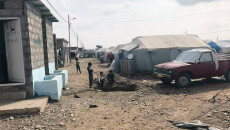Despite the hardships of living in the two camps in Kirkuk, thousands of IDPs are reluctant to return to their home regions due to fears of retaliation or the destruction of their homes.
The fear of some of those families stems from the fact that members of their families have fought against security forces during the ISIS war. Some were killed or disappeared. They now worry that those have been harmed by ISIS will exact revenge on them if they return to their home regions.
Another part of those families cannot go back because their homes are destroyed.
Zuhra Hama, an IDP at the Laylan camp in Kirkuk province, told KirkukNow: “The ones among us who haven’t returned yet, either have lost husbands or sons while fighting Peshmerga or Iraqi forces, or their houses are completely destroyed.”
Zuhra’s husband has been missing since 2014, “which has become a problem for us; we can neither go back home in fear of retaliation, neither can afford renting a place in the city,” she said.
According to the head of the Kirkuk’s Immigration and Displacement Office, Ammar Sabah, the government is making efforts to find a solution for those families.
Abas Muhammad from Nineveh’s Tal Afar district, who now resides at the Yahyawa camp in Kirkuk, says: “My home was flattened by ISIS militants, so I can’t return to my subdistrict. We appeal to the government to assist us and build homes for us, so that we can go back to our regions and resume our normal lives.”
There are still 2,000 families living in the camps of Kirkuk, according to a statistic from Kirkuk’s Immigration and Displacement Office. A committee has been set up by Kirkuk’s Administration to facilitate their return.
And we are now awaiting the decisions and guidelines from the government regarding those families that are flagged for security
“Of seven camps in Kirkuk, two remain open, which shelter 2,000 families – 9,000 persons. We have set up a committee under the leadership of the Kirkuk Operation’s Command to resolve the issue of returning the IDPs. And we are now awaiting the decisions and guidelines from the government regarding those families that are flagged for security.”
Some of those families, including Abas Muhammad’s, don’t have any source of income and can’t afford building a house.
Meanwhile, aid and assistance from the government and NGOs is gradually decreasing, according to some IDPs.
“There is currently no food distribution for the IDPs, an amount of cash is given to them instead so that they can purchase what they need themselves,” a source from one of the camps told KirkukNow.
The Iraqi security forces regularly conduct sweeping operations in the regions that aren’t yet safe for IDPs to return to due to the presence of ISIS militants.
Haydar al-Mutawri, commander of the 5th Division of the Federal Police, told KirkukNow: “Under orders from the prime minister and the minister of the interior, for the purpose of returning the IDPs to their home regions, we conducted a comprehensive operation at the end of past September. Our goal is eliminating danger on the lives of the IDPs once they return.”





